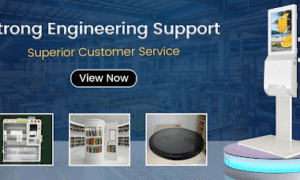In the bustling world of industry, where efficiency and productivity reign supreme, conveyor belts play an integral role in moving materials and goods smoothly and swiftly. Among the various types of conveyor belts available, fabric conveyor belts have emerged as a popular choice for numerous industrial applications. With their unique construction and advantageous features, fabric conveyor belts have revolutionized the way goods are transported in diverse sectors such as mining, agriculture, manufacturing, and logistics. In this blog, we will explore the remarkable advantages of fabric conveyor belts and understand why they have become a staple in modern industries.
Versatility and Adaptability
One of the most notable advantages of fabric conveyor belts is their versatility. These belts can be customized to suit a wide range of applications, making them suitable for handling different types of materials, shapes, and sizes. Whether it’s bulk materials like coal and ore, fragile goods, or packaged products, fabric conveyor belts can be designed to handle the specific requirements of each industry. Rubber conveyor belting has a relatively big impact on force and abrasion. Not Suitable for hot and oily materials on conveyors. Especially suitable for working in a severe environment, which requires relatively high belt dimension stability. If you are in search of Fabric Conveyor Belts, then check here for a wide range of Fabric Conveyor Belts.
Exceptional Strength and Durability
Fabric conveyor belts are constructed with layers of fabric materials, such as polyester or nylon, embedded with rubber or PVC compounds. This construction imparts excellent strength and durability to the belts, enabling them to withstand heavy loads and endure harsh operating conditions. The fabric layers offer high tensile strength, tear resistance, and impact resistance, ensuring that the belts can handle demanding industrial processes without compromising performance. Moreover, the materials used in fabric conveyor belts are known for their resistance to abrasion, extending the lifespan of the belts and minimizing maintenance costs.
Efficient and Reliable Operation
In industrial settings, efficiency and reliability are paramount. Fabric conveyor belts excel in both these aspects. Their smooth surface and flexible design allow for seamless material flow, reducing the risk of jams and minimizing downtime. The ability to transport materials continuously and at varying speeds ensures a constant and efficient workflow, boosting productivity. Moreover, fabric conveyor belts are designed to minimize slippage and maintain a strong grip on the conveyed materials, preventing spillage and ensuring safe transportation.
Cost-effective and Easy Maintenance
Fabric conveyor belts offer a cost-effective solution for material handling needs. Their robust construction and durability minimize the need for frequent replacements, reducing downtime and overall operational costs. Furthermore, fabric belts require relatively simple maintenance compared to other conveyor belt types. Routine maintenance tasks, such as cleaning, belt tracking adjustments, and occasional repairs, can be easily carried out, allowing for efficient operation and reducing maintenance expenses.
Environmental Considerations
With growing concerns about sustainability and environmental impact, fabric conveyor belts offer several advantages. Firstly, their energy-efficient operation reduces power consumption, contributing to overall energy conservation. Secondly, fabric belts are typically recyclable, which helps reduce waste and promote a circular economy. Additionally, the materials used in fabric conveyor belts are often free from harmful substances, making them environmentally friendly and safe for handling food-grade products.
Conclusion
Fabric conveyor belts have become an indispensable component in modern industrial processes, enabling the seamless movement of materials and goods across various sectors. Their versatility, exceptional strength, efficient operation, and cost-effectiveness make them the preferred choice for many industries. Moreover, their environmentally friendly features align with the growing focus on sustainability. As technology continues to advance, fabric conveyor belts will likely evolve further, enhancing efficiency, reducing environmental impact, and contributing to the continued progress of industries worldwide.



































